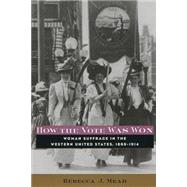How the Vote Was Won
, by Mead, Rebecca J.- ISBN: 9780814757222 | 0814757227
- Cover: Paperback
- Copyright: 1/1/2006
View the Table of Contents. Read the Introduction. In this densely written and tightly argued work, Mead (Northern Michigan Univ.) presents answers to the often asked question of why woman suffrage was accomplished in the US West well before it was in the East. -Choice In this superb study . . . Rebecca J. Mead convincingly demonstrates the importance of the region to understanding the success of the national suffrage movement. -American Historical Review This concise book is the msot complete overview to date of the woman suffrage movement in the American West. -The Journal of Arizona History Mead has produced a strong case for western women's well-reasoned, winning plan and has provided a superb foundation for renewed engagement with an important question. My thanks to you, Professor Mead. -Register of the Kentucky Historical Society Thanks to Mead's extensive research and careful weighing of evidence, no future scholar will be able to work from the assumption that the East represents the nation in the history of women's enfranchisement. She has laid the critical foundation for a genuinely national history of one of the most important developments in modern America. -Reviews in American History Moving beyond the traditional emphasis on the work of radical women to include the larger political and social context, Mead's book makes a strong contribution to our understanding of our history of nineteenth century women, western United States politics, and issues of gender and law. -Utah Historical Quarterly Mead...deserves respect for embarking on an ambitious undertaking that necessitated very extensive research which she covered meticulously. She has revisited this significant political transformation with the tools of recent historical scholarship to the fore and contributed constructively to a complex area of modern political history. -Australasian Journal of American Studies In this comprehensive estimation, Mead not only answers the question of why western states were ahead of the curve in granting women the vote, but also examines the relationships, often tense, between the local, state, and national suffrage associations as well as with farm, labor and progressive coalitions. -Montana: The Magazine of Western History Rebecca Mead has crafted a detailed history of suffrage campaigns in the western states. -United Source This book should challenge historians of woman suffrage to look more closely at other regions and states. . . . But it is Mead's treatment of a political culture among women with its own history, burdens, crosscurrents, and innovators that should have the wider impact. -Journal of American History By the end of 1914, almost every Western state and territory had enfranchised its female citizens in the greatest innovation in participatory democracy since Reconstruction. These Western successes stand in profound contrast to the East, where few women voted until after the ratification of the Nineteenth Amendment in 1920, and the South, where African-American men were systematically disenfranchised. How did the frontier West leap ahead of the rest of the nation in the enfranchisement of the majority of its citizens? In this provocative new study, Rebecca J. Mead shows that Western suffrage came about as the result of the unsettled state of regional politics, the complex nature of Western race relations, broad alliances between suffragists and farmer-labor-progressive reformers, and sophisticated activism by Western women. She highlights suffrage racism and elitism as major problems for the movement, and places special emphasis on the political adaptability of Western suffragists whose improvisational tactics earned them progress. A fascinating story, previously ignored, How the Vote was Won reinte







